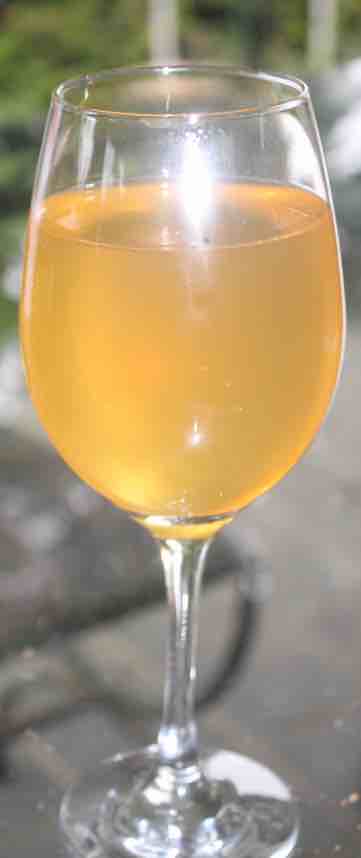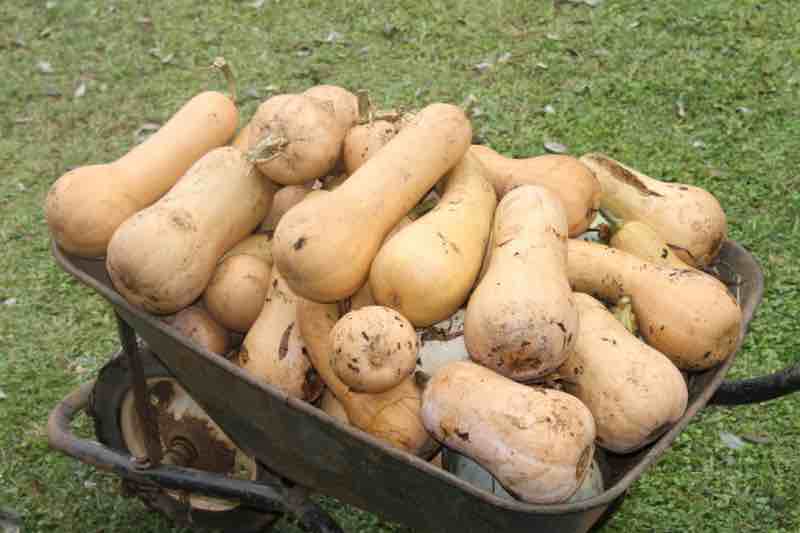- Bernard Preston homepage
- Yellows
- Butternut Honey Mead Recipe
Butternut honey mead recipe
This butternut honey mead recipe means one can enjoy the benefits of this wonderful vegetable all year round as a probiotic. Preserving food has always been difficult; using alcohol, like salt and sugar is just one other way. All have their dangers.
Yet I would suggest they are less dangerous than the many chemicals used today by the food industry to preserve food. Nevertheless let all who plan to start using this butternut honey mead recipe take good note of this proverb.
"Wine, beer and spirits make good servants but very bad masters."

Others would say that we should eat seasonally and look for other sources of vitamin-A during the long winter and ensuing spring; they too have a point.
Only for those with an excess
This butternut honey mead recipe is only for those with an excess of the vegetable. In one sense this goes entirely against the grain; you will toss the fibrous part that is so beneficial for the microbiome. Perhaps one could add it to a soup or stew as a thickening agent.
Making butternut honey mead is also only for those with an excess of natural honey. 8kg will cost you over R1,000 if you have to purchase it; roughly fifty rand for each 750ml bottle eventually produced. We extract it without heating from the gleanings in the cappings.
As a rule of thumb each kilogramme of cappings contains about 30 - 40% excellent wild honey; you will also get to enjoy some of the benefits of the pollen and propolis.
Ingredients
- 3kg butternut
- 8kg natural honey
- 1/8 onion
- 1 leek
- 1 stick cinnamon
- 1 tsp freshly-ground cumin
- 1 tsp freshly-ground coriander
- 2tsp black tea
- Unchlorinated water
Go for it
- 23L carboy.
- Boil the tea in 1L water for 10 minutes. Strain.
- Boil the rest of the ingredients for 30 mins. Mash.
- Place the cooked ingredients into a muslin bag with marbles or river stones to weight it down.
- Add the honey and fill to half-way with warm water. Shake vigorously for 5 minutes to aerate the liquid.
- Fill the carboy to 7cm below the bung.
- Measure the pH and SG.
Large carboys half-filled with water are heavy; I recommend two people do the aerating.
The pH range you want is 3,5 to 4,5. Add 1.25ml of bicarb or tartaric acid per 0,5 adjustment on 5 litres in tranches; it may bubble over. You could also use lemon juice if it is too alkaline.
After mixing in the powder recheck the pH. I usually do my adjustments before fermentation but have needed to do it again at racking sometimes.
Racking
All yeast products have a mind of their own, just talk to bakers, but these are the guidelines for when to rack your mead.
- I usually do my first rack 6 - 12 weeks after starting the brew.
- I rack it a second time after it is clear which could be 6 - 12 months later.
- If it was very clear when I started my 2nd rack then after a week or two would move to bottling.
- If not clear then another rack and when it is clear followed by bottling.
- I keep a bottle of high quality all-hive mead for topping up the demijohns to reduce the air gap.
Probiotic
Home brews in general contain many natural yeast cells that will contribute to the microbiome that is so lacking in many folk today; the happy tum contains an incredible 2kg of friendly bugs. Most of us fall far short.
Most commercial wines and beers have been preserved by pasteurisation or with sulphur dioxide. A high alcohol concentration will also kill the yeast so there is some sense in enjoying your butternut honey tipple as a so-called "session mead;" before it has matured and become too strong.
The flavour will not be as good so we enjoy this butternut honey mead recipe both ways; first a few weeks after fermentation has begun and later after it has been racked several times and allowed to mature.
Provitamin A

Butternut is rich in provitamin A compounds such as beta-carotene. We simply cannot be healthy without these phytonutrients and indeed a staggering half million children go blind every year because of a deficiency[1].
There are of course many other phytochemicals in the nectar that the bees have sourced from the myriad of flowers they have visited; most are lost in the refining of commercial honey.
There are many others found in the onion and leek, of course; quercetin is another of these flavonoids with proven properties of helping to control blood sugar, not unimportant in a sweet mead, and preventing both heart disease and malignant tumours[2].
Your butternut honey mead recipe can truly be called a functional food; those that promote health and help prevent disease. That's provided it remains a serf and not the master of the house.
Butternut honey mead recipe
This butternut honey mead recipe preserves the valuable carotenoids in the vegetable; they are especially important for the eyes.
When browsing use right click and "Open Link in New Tab" or you may get a bad gateway signal.
Newsletter
Our newsletter is entitled "create a cyan zone" at your home, preserving both yourself and Mother Earth for future generations; and the family too, of course. We promise not to spam you with daily emails promoting various products. You may get an occasional nudge to buy one of my books.
Here are the back issues.
- Lifestyle and ideal body weight
- What are ultra-processed foods?
- Investing in long-term health
- Diseases from plastic exposure
- Intensive lifestyle management for obesity has limited value
- A world largely devoid of Parkinson's Disease
- The impact of friendly bacteria in the tum on the prevention of cancer
- There's a hole in the bucket
- Everyone is talking about weight loss drugs
- Pull the sweet tooth
- If you suffer from heartburn plant a susu
- Refined maize meal and stunting
- Should agriculture and industry get priority for water and electricity?
- Nature is calling
- Mill your own flour
- Bake your own sourdough bread
- Microplastics from our water
- Alternative types of water storage
- Wear your clothes out
- Comfort foods
- Create a bee-friendly environment
- Go to bed slightly hungry
- Keep bees
- Blue zone folk are religious
- Reduce plastic waste
- Family is important
- What can go in compost?
- Grow broad beans for longevity
- Harvest and store sunshine
- Blue zone exercise
- Harvest and store your rainwater
- Create a cyan zone at your home
Did you find this page interesting? How about forwarding it to a friendly book or food junkie? Better still, a social media tick would help.
- Bernard Preston homepage
- Yellows
- Butternut Honey Mead Recipe
Address:
56 Groenekloof Rd,
Hilton, KZN
South Africa
Website:
https://www.bernard-preston.com